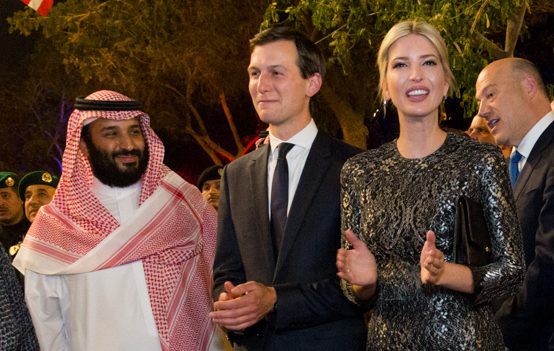What Explains Trump’s Twisted Embrace of Saudi Arabia?

The Washington Post comments on the president’s Saudi First response to the Pensacola attack:
Mr. Trump has an inexplicable blind spot for Saudi Arabia. He has no trouble insulting in the vilest way people from other Muslim countries. He is hostile generally to people from “shithole” countries. After a terrorist attack in London, he said on Twitter, “These animals are crazy and must be dealt with through toughness and strength!” But when a Saudi carries out an attack on a U.S. military base, Mr. Trump becomes a spokesman and apologist for the king.
There is no question that Trump is unusually protective of the Saudi government even for a U.S. president, but I’m not sure that it is as inexplicable as all that. Like other anti-Muslim figures in his party, the president has a special regard for the Saudis because they are as anti-Iranian as he is. Perhaps more important for Trump is the fact that his son-in-law has cultivated a relationship with the Saudi crown prince. It was no accident that Trump’s first foreign trip as president was to Riyadh. Kushner was instrumental in persuading Trump to go there. Trump’s reflexive backing for the blockade of Qatar shortly after that visit was another result. The connection between the two princelings likely accounts for a significant part of U.S. foreign policy during the first three years of Trump’s presidency.
We should assume that the extensive pro-Saudi and pro-Emirati lobbying efforts that have been working overtime in Washington during this same period have contributed to the president’s almost comical subservience to the interests of these client states. Ben Freeman describes the effects of these efforts in distorting U.S. foreign policy:
As foreign lobbyists are writing our representatives’ speeches, and even writing our laws, this considerable influence largely pushes U.S. foreign policy in a much more militarized and interventionist direction. Two of the biggest spenders on influence in America—Saudi Arabia and the United Arab Emirates—have, for years, focused their lobbying and public relations efforts on maintaining U.S. military support for their war in Yemen and continuing the flow of U.S. military weaponry to both countries.
The president has been one of the loudest defenders and strongest supporters of continued backing for the war on Yemen, and he has gone out of his way and abused his power to expedite arms sales to these governments. Trump’s record has been filled with doing favors for the Saudi government that his apparent enthusiasm for arms sales alone can’t explain.
We are daily becoming aware of the extent of the administration’s corruption, and we still do not fully know the role of foreign money and influence from these countries in shaping the administration’s policies. If a president consistently puts the interests of another government ahead of American interests, there is probably something else going on beyond extremely bad foreign policy judgment. Trump’s absurd pro-Saudi bias is not inexplicable, but it is still in need of a fuller explanation. The rest of the answer is more likely found in lobbying and the president’s family and business ties. Whatever the full explanation turns out to be, the ever-closer embrace of the Saudis has been a disaster for U.S. foreign policy, the people of Yemen, and the stability of the region.